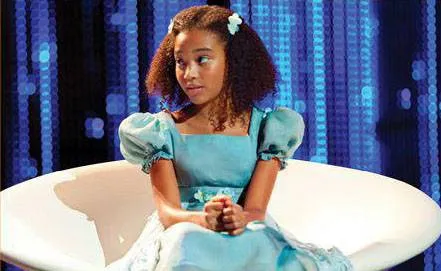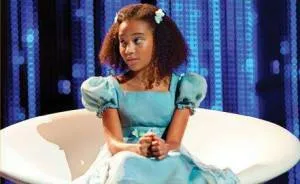
Rue, Race, and The Hunger Games
Rue is not white. In the novel The Hun ger Games, Katniss describes Rue as “a twelve-year-old girl from District 11. She has dark brown skin and eyes, but other than that, she’s very like Prim in size and demeanor.” If that is not enough to suggest African-American, as opposed to Hispanic or Asian, then take the author at her word: she is African-American. I am confused, then, by the people out there who are upset that the actress cast in the role of Rue is also African-American. This is one case in which the casting was done as it should be. So what’s the problem?
There are actual cases in which a white character has been made a different race in the film adaptation. Take Red in The Shawshank Redemption. In the original Stephen King novella, Rita Hayworth and The Shawshank Redemption, Red is white. True, there is no direct description like Collins provides for Rue, but the information that Red shares about himself suggests that he is white:
ger Games, Katniss describes Rue as “a twelve-year-old girl from District 11. She has dark brown skin and eyes, but other than that, she’s very like Prim in size and demeanor.” If that is not enough to suggest African-American, as opposed to Hispanic or Asian, then take the author at her word: she is African-American. I am confused, then, by the people out there who are upset that the actress cast in the role of Rue is also African-American. This is one case in which the casting was done as it should be. So what’s the problem?
There are actual cases in which a white character has been made a different race in the film adaptation. Take Red in The Shawshank Redemption. In the original Stephen King novella, Rita Hayworth and The Shawshank Redemption, Red is white. True, there is no direct description like Collins provides for Rue, but the information that Red shares about himself suggests that he is white:
 ger Games, Katniss describes Rue as “a twelve-year-old girl from District 11. She has dark brown skin and eyes, but other than that, she’s very like Prim in size and demeanor.” If that is not enough to suggest African-American, as opposed to Hispanic or Asian, then take the author at her word: she is African-American. I am confused, then, by the people out there who are upset that the actress cast in the role of Rue is also African-American. This is one case in which the casting was done as it should be. So what’s the problem?
There are actual cases in which a white character has been made a different race in the film adaptation. Take Red in The Shawshank Redemption. In the original Stephen King novella, Rita Hayworth and The Shawshank Redemption, Red is white. True, there is no direct description like Collins provides for Rue, but the information that Red shares about himself suggests that he is white:
ger Games, Katniss describes Rue as “a twelve-year-old girl from District 11. She has dark brown skin and eyes, but other than that, she’s very like Prim in size and demeanor.” If that is not enough to suggest African-American, as opposed to Hispanic or Asian, then take the author at her word: she is African-American. I am confused, then, by the people out there who are upset that the actress cast in the role of Rue is also African-American. This is one case in which the casting was done as it should be. So what’s the problem?
There are actual cases in which a white character has been made a different race in the film adaptation. Take Red in The Shawshank Redemption. In the original Stephen King novella, Rita Hayworth and The Shawshank Redemption, Red is white. True, there is no direct description like Collins provides for Rue, but the information that Red shares about himself suggests that he is white:
I was young, good-looking, and from the poor side of town. I knocked up a pretty, sulky, headstrong girl who lived in one of the fine old houses on Carbine Street. Her father was agreeable to the marriage if I would take a job in the optical company he owned and ‘work my way up’.The story picks up in the late 1940s, when Red has already served several years on his back-to-back life sentences. Had he been a black man during that time, even as far North as Maine, he would not have found himself married to the daughter of a wealthy, and undoubtedly white, businessman. Later in the story, he explains his skill at getting things for other prisoners as a result of his Irish ancestry. The description just does not conjure up an image of Morgan Freeman, but fans of King’s work accepted his portrayal. For many book lovers, Shawshank ranks as one of the best page-to-screen adaptations out there. I do not remember a lot of people getting upset when Will Smith was cast in the role of Robert Neville, the white protagonist from Richard Matheson’s 1954 horror novel I Am Legend. It was okay. Some even saw Smith’s casting as an indication of progress, a sign that barriers were coming down. After the negative reaction to Rue, I am not sure if “progress” is the best word to use. Both Freeman and Smith are extremely talented actors who more than deserved to play the parts that they did (I actually like I Am Legend, though I know not everyone shares that opinion). They were cast on the basis of their talent, and few questioned that decision. It was easy to forget a little detail like what the author of the adapted work had actually written. Authors take great care in creating their characters. If they go so far as to specify a character’s race, ethnicity, or even sexual preference, they do so for a reason. They see that detail as being essential to the story. Changing that detail for a film, no matter the motivation, changes the story. Sometimes, it changes it in a good way. I think that it worked for Shawshank. I do not think it would have mattered in I Am Legend. Making Rue white, however, would not have worked. It would have made Collins’ story seem insincere. When the film was first announced, some people were upset with the casting of the lead characters, including Jennifer Lawrence, because she does not fit the picture they had in their heads. They saw her as biracial, with her dark hair and olive skin. Collins answered their criticism, however, by pointing out the she had not specified an ethnicity:
They were not particularly intended to be biracial. It is a time period where hundreds of years have passed from now. There’s been a lot of ethnic mixing. But I think I describe them as having dark hair, grey eyes, and sort of olive skin. You know, we have hair and makeup.In this case, readers of the novel were upset because the actor did not fit with what they imagined. And that is understandable. They were worried about the integrity of the story. Criticizing the casting of Rue based solely on her race, however, is disrespectful to both Collins and the story she has created. If people are going to get angry about the way that their favorite book characters are cast in film adaptations, then they should make sure they are getting angry for the right reasons.










